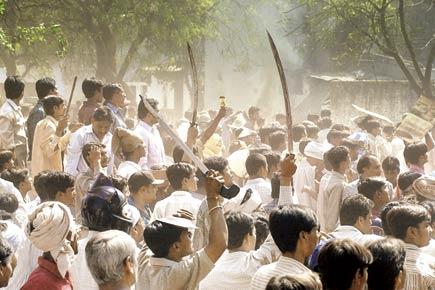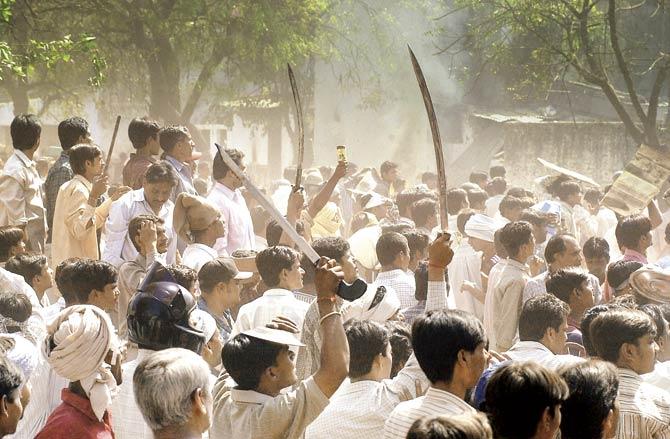I have lived through two riots and both still give me nightmares: The bloodshed, the mayhem, the destruction, the exultation of the killer and the sheer despair of the victim

 I have lived through two riots and both still give me nightmares: The bloodshed, the mayhem, the destruction, the exultation of the killer and the sheer despair of the victim. It is hard to reconcile your mind to ordinary, regular people turning into mass murderers. You do not want to do it but I at least could not help looking at people I met every day and wondering if they had just come back to the chores of daily life after gouging out a neighbour’s stomach or burning their shops or blowing up a gas cylinder in their home.
I have lived through two riots and both still give me nightmares: The bloodshed, the mayhem, the destruction, the exultation of the killer and the sheer despair of the victim. It is hard to reconcile your mind to ordinary, regular people turning into mass murderers. You do not want to do it but I at least could not help looking at people I met every day and wondering if they had just come back to the chores of daily life after gouging out a neighbour’s stomach or burning their shops or blowing up a gas cylinder in their home.

This picture from March 2002 shows mobs clashing during the communal riots in Ahmedabad. Pic/AFP
ADVERTISEMENT
And yet, although we are programmed for justice in almost every aspect of our lives, we seem to accept that rioters will get away with it. They will slink back into the quotidian, the tedium and we will paper over the cracks.
The events of the last few weeks have taken me inexorably back to those horrors, of Bombay 1993 and Gujarat 2002 and every other riot I have read about and heard about, most notably Delhi 1984 and Nellie 1983. In all of them, victims will tell you that their neighbours destroyed them and their neighbours helped them.
Terrorists, we are told, are indoctrinated and brainwashed by religion or ideology. Single white males in the US who shoot and kill in public places are psychological or psychiatric cases. Members of the Armed Forces who have to kill in war, the police and other investigating agencies are usually traumatised by the devastation they have seen or deaths they have caused. They need counselling to recover and some are always haunted by it. Train drivers, for instance, can take ages to recover when people step on to the tracks in front of them and the train is going too fast to save them. People who enjoy killing, we are told, are special psychopaths who have no empathy and no morality.
And yet, we accept that people who kill, maim, loot and vandalise in riots should be allowed to go back to normal life so that “old wounds are not raked up” or so we can “let bygones be bygones”. If we are angry, we pick on politicians or the police or rail against the establishment in general. But we, who are so insistent on justice otherwise, are seemingly forgiving in this one instance.
As Yakub Memon, the only person sentenced to death for his role in the March 1993 Bombay bomb blasts, lost his bid for commutation to life at the Supreme Court and was hanged last week, there was much talk about justice being done for the victims. And indeed it was, sort of. The real masterminds remain alive, possibly in Pakistan but whoever was caught in India has been punished.
Meanwhile, Maya Kodnani and Babu Bajrangi, sentenced for their role in the 2002 riots are out on bail. The judge who sentenced them, Jyotsna Yagnik, says she fears for her life. And another judge, Himanshu Trivedi, who worked with Yagnik, says he quit over the Gujarat government’s anti-Muslim bias. People who were opposed to Yakub Memon’s death sentence were deemed anti-national. And Teesta Setalvad, who fought for justice for the riot victims of Bombay 1992-1993 and Gujarat 2002 is being hounded for financial impropriety and “abetting communal disharmony”.
That the Mumbai of today has been irreparably damaged by Bombay of yesterday is indisputable. The city came together after the bomb blasts but no “spirit” of the day could stop those social fissures from appearing. Gujarat has an incredible knack of pretending when it comes to such matters and that is why there have been little conflagrations for over a century. I am not knowledgeable enough about Delhi, but I am sure it carries indelible scars. Justice has been seen to be done in some cases in Gujarat but for the rest we have silence that is equal to collusion.
Perhaps it is time to rake up old wounds. Perhaps it is time to go back to what happened and make reparations, if not justice. Colonial powers are expected to apologise to those that they subjugated. But we the people of a sovereign nation know that we can get away with crimes that we commit against each other, as long as we collect together in a murderous mob.
Ranjona Banerji is a senior journalist. You can follow her on Twitter @ranjona
 Subscribe today by clicking the link and stay updated with the latest news!" Click here!
Subscribe today by clicking the link and stay updated with the latest news!" Click here!







